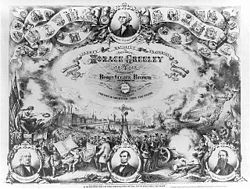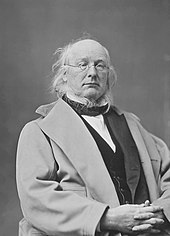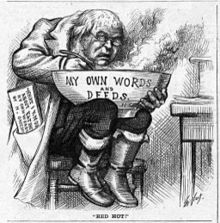
The 1872 United States presidential election was the 22nd quadrennial presidential election, held on Tuesday, November 5, 1872. Despite a split in the Republican Party, incumbent President Ulysses S. Grant defeated Democratic-endorsed Liberal Republican nominee Horace Greeley.
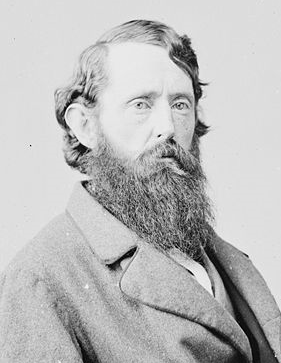
Benjamin Gratz Brown was an American politician. He was a U.S. Senator, the 20th Governor of Missouri, and the Liberal Republican and Democratic Party vice presidential candidate in the presidential election of 1872.
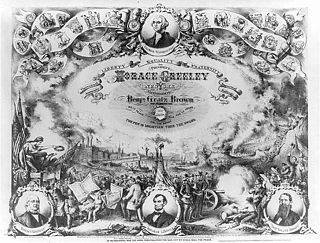
The Liberal Republican Party was an American political party that was organized in May 1872 to oppose the reelection of President Ulysses S. Grant and his Radical Republican supporters in the presidential election of 1872. The party emerged in Missouri under the leadership of Senator Carl Schurz and soon attracted other opponents of Grant; Liberal Republicans decried the scandals of the Grant administration and sought civil service reform. The party opposed Grant's Reconstruction policies, particularly the Enforcement Acts that destroyed the Ku Klux Klan. It lost in a landslide, and disappeared from the national stage after the 1872 election.

The 1872 Democratic National Convention was a presidential nominating convention held at Ford's Grand Opera House on East Fayette Street, between North Howard and North Eutaw Streets, in Baltimore, Maryland on July 9 and 10, 1872. It resulted in the nomination of newspaper publisher Horace Greeley of New York and Governor Benjamin Gratz Brown of Missouri for president and vice president, a ticket previously nominated by the rump Liberal Republican faction convention meeting, also held in Baltimore's newly built premier Opera House of nationally well-known theatre owner/operator John T. Ford of the major Republican Party, which had already re-nominated incumbent President Ulysses S. Grant of the regular Republicans for another term.

The 1872 United States presidential election in New York took place on November 5, 1872. All contemporary 37 states were part of the 1872 United States presidential election. Voters chose 35 electors to the Electoral College, which selected the president and vice president.

The 1872 United States elections were held on November 5, electing the members of the 43rd United States Congress. The election took place during the Third Party System. The election took place during the Reconstruction Era, and many Southerners were barred from voting. Despite a split in the party, the Republicans retained control of the presidency and both houses of Congress.
An influential group of dissident Republicans split from the party to form the Liberal Republican Party in 1870. At the party's only national convention, held in Cincinnati in 1872, New York Tribune editor Horace Greeley was nominated for president on the sixth ballot, defeating Charles Francis Adams. Missouri Governor Benjamin Gratz Brown was nominated for vice-president on the second ballot. They were also nominated at the 1872 Democratic National Convention two months later.

The 1872 United States presidential election in Texas was held on November 5, 1872, as part of the 1872 United States presidential election. State voters chose eight electors to represent the state in the Electoral College, which chose the president and vice president.

The 1872 United States presidential election in Rhode Island took place on November 5, 1872. All contemporary 37 states were part of the 1872 United States presidential election. The state voters chose four electors to the Electoral College, which selected the president and vice president.
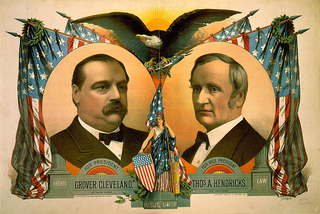
The 1884 presidential election was the first nationwide campaign in which Grover Cleveland participated and the first of two in which he emerged victorious. This election pitted Democratic Party nominee Cleveland against Republican party nominee James G. Blaine and the campaign centered on corruption, civil service reforms, and political scandals. In this election, Cleveland portrayed himself as the clean and honest candidate in contrast to Blaine, who was portrayed as corrupt.
"Straight-Out Democratic Party" is the name used by three minor American political parties between 1872 and 1890.

The 1872 United States presidential election in Kentucky took place on November 5, 1872, as part of the 1872 United States presidential election. Voters chose 12 representatives, or electors to the Electoral College, who voted for president and vice president.

The 1872 United States presidential election in Georgia took place on November 5, 1872, as part of the 1872 United States presidential election. Voters chose 11 representatives, or electors to the Electoral College, who voted for president and vice president.

In 1868, the Democrats nominated former New York Governor Horatio Seymour for President and Francis Preston Blair Jr. for Vice President. The Seymour-Blair ticket ran on a platform which supported national reconciliation and states' rights, opposed Reconstruction, and opposed both Black equality and Black suffrage. Meanwhile, the Republican presidential ticket led by General Ulysses S. Grant benefited from Grant's status as a war hero and ran on a pro-Reconstruction platform. Ultimately, the Seymour-Blair ticket ended up losing to the Republican ticket of General Ulysses S. Grant and House Speaker Schuyler Colfax in the 1868 U.S. presidential election.

The 1872 United States presidential election in Iowa took place on November 5, 1872. All contemporary 37 states were part of the 1872 United States presidential election. The state voters chose 11 electors to the Electoral College, which selected the president and vice president.

The 1872 United States presidential election in Maryland took place on November 5, 1872. All contemporary 37 states were part of the 1872 United States presidential election. The state voters chose eight electors to the Electoral College, which selected the president and vice president.

The Delaware Straight-Out Truth Teller was an American semi-monthly newspaper based in Wilmington, Delaware. It was founded in 1872 by William Dean and John A. Brown in response to political dissension in relation to the United States presidential election of that year. The paper supported the Straight-Out Democratic Party presidential candidate Charles O'Conor and was a strong opposer of Liberal Republican Party candidate Horace Greeley. Its motto was "O'Conor & Adams; Honesty, Patriotism and Statesmanship." The paper appears to have ceased publishing after the election ended.
